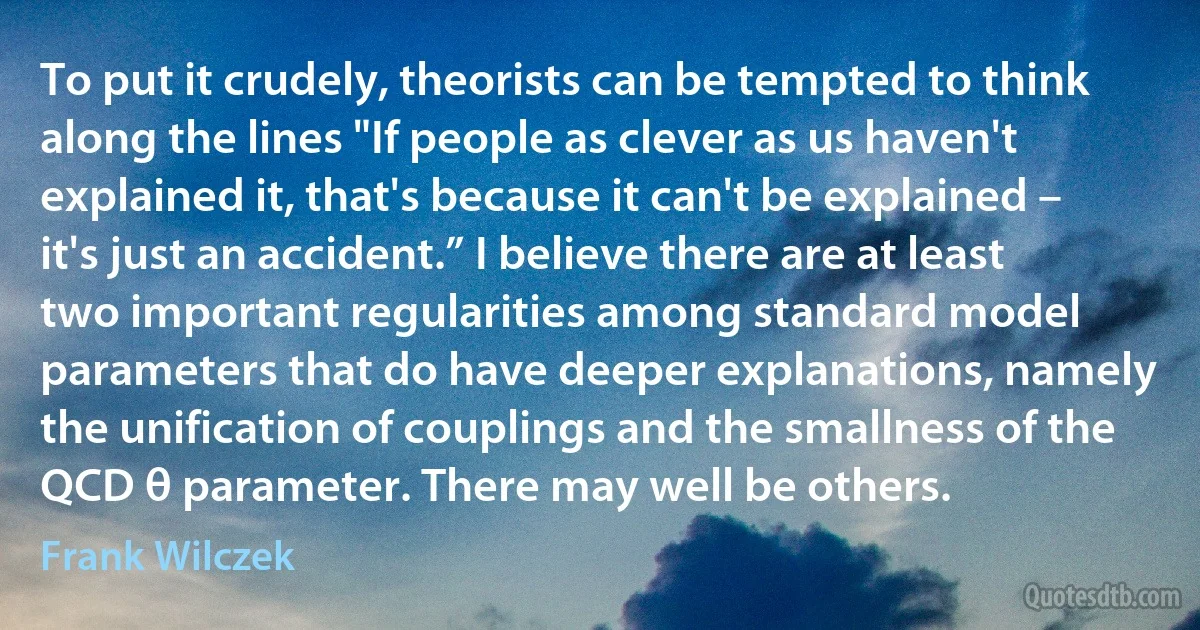Others Quotes - page 86
Nature is interested in only two things-to survive and to reproduce one like itself. Anything you superimpose on that, all the cultural input, is responsible for the boredom of man. So we have varieties of religious experience. You are not satisfied with your own religious teachings or games; so you bring in others from India, Asia or China. They become interesting because they are something new. You pick up a new language and try to speak it and use it to feel more important. But basically, it is the same thing.

Thomas Ligotti
The idea of revelation is the idea of special knowledge of God, or of religious truth, possessed by some people and transmitted by them to others. In some form or other the idea is reasonable. In all other matters people differ in their degree of skill or insight. Why not in religion?

Charles Hartshorne
Scots have also for these past three hundred been part of a political union - the United Kingdom. Some of you may argue this is three hundred years too long. Others may disagree. But Scotland has played its full part in the Union - meeting our obligations and advancing the common good, without ever losing sight of our distinctive identity and values. And our destiny.

Alex Salmond
God thus includes the world; he is, in fact, the totality of world parts, which are indifferently causes and effects. Now AR [absolute perfection in some respects, relative perfection in all others] is equally far from either of these doctrines; thanks to its two-aspect view of God, it is able consistently to embrace all that is positive in either deism or pandeism. AR means that God is, in one aspect of himself, the integral totality of all ordinary causes and effects, but that in another aspect, his essence (which is A), he is conceivable in abstraction from any one or any group of particular, contingent beings (though not from the requirement and the power always to provide himself with some particulars or other, sufficient to constitute in their integrated totality the R aspect of himself at the given moment).

Charles Hartshorne
These distinctions make sense only when AR [absolute perfection in some respects, relative perfection in all others] is assumed (hence Spinoza's failure, who assumed mere A). Just as AR is the whole positive content of perfection, so CW, or the conception of the Creator-and-the-Whole-of-what-he-has-created as constituting one life, the super-whole which in its everlasting essence is uncreated (and does not necessitate just the parts which the whole has) but in its de facto concreteness is created – this panentheistic doctrine contains all of deism and pandeism except their arbitrary negations. Thus ARCW, or absolute-relative panentheism, is the one doctrine that really states the whole of what all theists, if not all atheists as well, are implicitly talking about.

Charles Hartshorne
I believe that here we are in full agreement on the tremendous role that faith schools can play in Scottish society. And they do so by endowing our children with a strong moral foundation. A positive and distinctive identity. A keen sense of personal responsibility and the common good. A strong commitment to charity - the true meaning of which is helping others.

Alex Salmond
Scotland has a global identity. We have always been internationalists, looking beyond our shores for ideas, influences and ways that we can enrich others. Scotland has deep ties of kinship and history with the Commonwealth. And the Scots Diaspora has a prominent place in the history of the United States, Canada and many nations.

Alex Salmond
In the course of his presidency, Obama has gone from an almost magical charismatic figure to an ordinary politician. Ordinary. Average. His approval ratings are roughly equal to what the last five presidents' were at the same time in their first term. [...] He will not be the great transformer he imagines himself to be. A president like others -- with successes and failures.

Charles Krauthammer
Many words have no legal meaning. Others have a legal meaning very unlike their ordinary meaning. For example, the word 'daffydown-dilly.' It is a criminal libel to call a lawyer a daffy-down-dilly. Ha! Yes, I advise you never to do such a thing. No, I certainly advise you never to do it.

Dorothy L. Sayers
God, the pure limit and pure beginning of all that we are, have, and do, standing over in infinite qualitative difference to man and all that is human, nowhere and never identical with that which we call God, experience, surmise, and pray to as God, the unconditioned Halt as opposed to all human rest, the Yes in our No and the No in our Yes, the first and last and as such unknown, but nowhere and never a magnitude amongst others in the medium known to us, God the Lord, the Creator and Redeemer... that is the living God.

Karl Barth
He exists, not only inconceivably as God, but also conceivably as a man; not only above the world, but also in the world, and of the world; not only in a heavenly and invisible, but in an earthly and visible form. He becomes and is, He exists-we cannot avoid this statement; to do so would be the worst kind of Docetism-with objective actuality. Does this mean, then, that He exists as one thing amongst others, and that as such He can be perceived and may be known like other things? Well, we cannot deny that He is a thing like this, and can be perceived and knovra as such, if He was and is a man in the world, with an earthly and visible form. But, of course, a man is not merely a thing or object. As a man among men he is a human Thou, and as such distinct from all mere things.

Karl Barth



